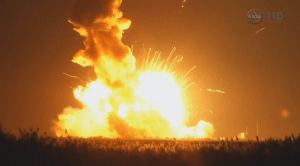Orbital Sciences Initiates Investigation into Antares Explosion
[Via Satellite 10-29-2014] An Orbital Sciences Antares rocket suffered a launch failure at 6:22 p.m. Eastern Standard Time (EST) on Oct. 28. The mission, the third of eight in the company’s $1.9 billion Commercial Resupply (CRS) contract with NASA, was carrying 2215 kg of cargo, including 26 satellites for Planet Labs, the Arkyd 3 satellite for Planetary Resources, and the Radiometer Atmospheric CubeSat Experiment (RACE) for the University of Texas and NASA’s Jet Propulsion Laboratory (JPL).
NASA and Orbital Sciences reported that, fortunately, no one was hurt during the launch failure. In a press conference held the evening after the failure, Orbital Sciences Executive Vice President Frank Culbertson said the explosion appeared to be a “disassembly of the first stage,” but that an exact cause remains unknown.
Two AJ-26 engines from Aerojet Rocketdyne power the Antares first stage. Orbital Sciences has been attempting to move away from these engines in the past, and recently selected a successor. The new engine remains unannounced, but in an Oct. 29 conference call, David Thompson chairman, president and CEO of Orbital Sciences, said the company might look to speed up the transition.
“Under the original plan we were — as of now — about two years away from conducting the first launch of an Antares with the second generation propulsion system. We are currently looking at the prospects for accelerating the adoption of that system,” he said, adding that, for now, there is not a firm estimate for how much of that two-year period could be compressed.
Orbital Sciences has created a review board with NASA, the Mid-Atlantic Regional Spaceport (MARS) and the U.S. National Transportation Safety Board (NSTB) that will carry out the failure review and recommend corrective actions. The launch was the fifth for Antares and the fourth with the Cygnus capsule. Thompson reiterated that Orbital Sciences will continue to develop the Antares rocket for future launch services.
“We are certainly disappointed by this failure but in no way are we discouraged or dissuaded from our objectives to expand the Antares rocket well into the medium launch class,” he said.
Thompson declined to comment on how the recent launch failure and the move to expedite replacing the AJ-26 could impact non-NASA contracts. Orbital Sciences’ main Antares customer is NASA, but the company is seeking to provide launch services for others as well.
A primary concern immediately following the accident was the state of the Wallops Island launch pad in Virginia. As the only location capable of launching Antares, its fate would have a veritable impact on when Antares could return to flight. Thompson said preliminary inspections show the launch complex was largely spared from major damage. Nearby related facilities were entirely unscathed. Garrett Pierce, vice chairman and CFO at Orbital Sciences, said the cost of repairs to the launch site is completely reimbursable by insurance.
The next Antares mission was scheduled for April 2015 but Thompson said it is too soon to determine how this will impact the schedule for the next resupply missions.
Hours after the Antares failure, a Russian Soyuz delivered a Progress vessel to the International Space Station (ISS). William Gerstenmaier, associate administrator of NASA’s human exploration and operations directorate, said Oct. 28 that the manifest for SpaceX’s Dec. 9 resupply mission will likely see some changes.
“I would anticipate that there will be some delay in the next scheduled Antares launch … I think [the] reasonable best-case estimate would bound that at three months, but it certainly could be considerably longer than that depending on what we find in the review. I would hope it would be not more than a year,” said Thompson.
Over the next several days the review board will analyze video and telemetry data along with the wreckage.
Orbital Sciences has enough AJ-26 engines in stock to complete the remaining missions under the CRS contract. Thompson said the merger with ATK does not include a clause regarding launch failures. He anticipates the investigation review board will draw preliminary conclusions in days, not weeks, to define the list of most likely causes of the accident. It may take longer to come to a final conclusion, he said.
